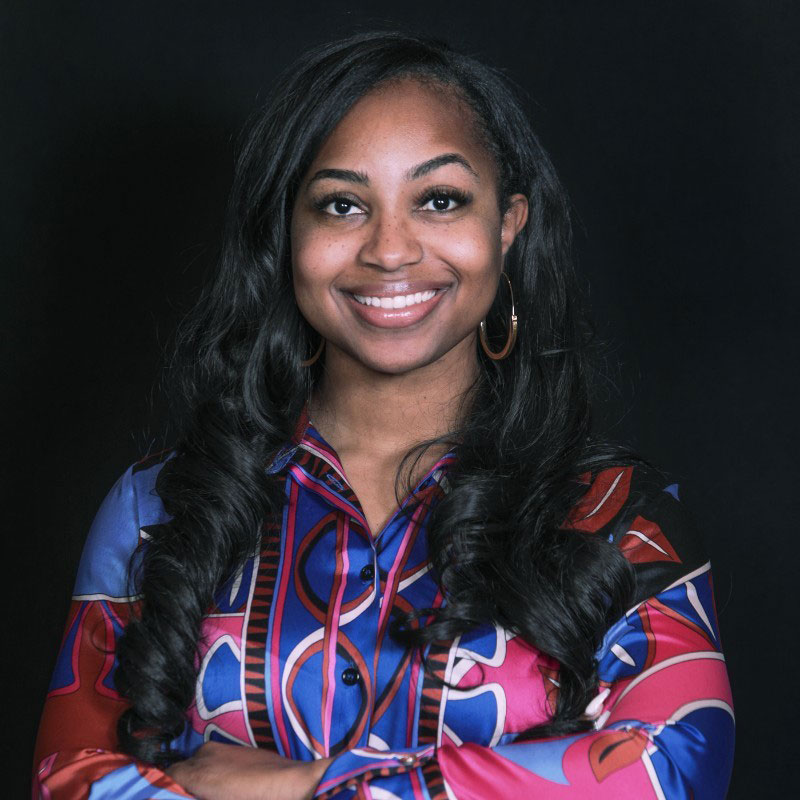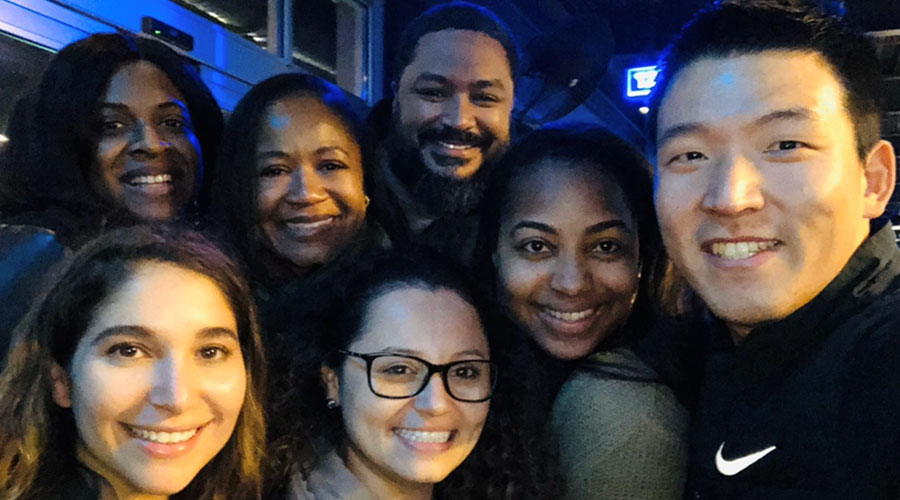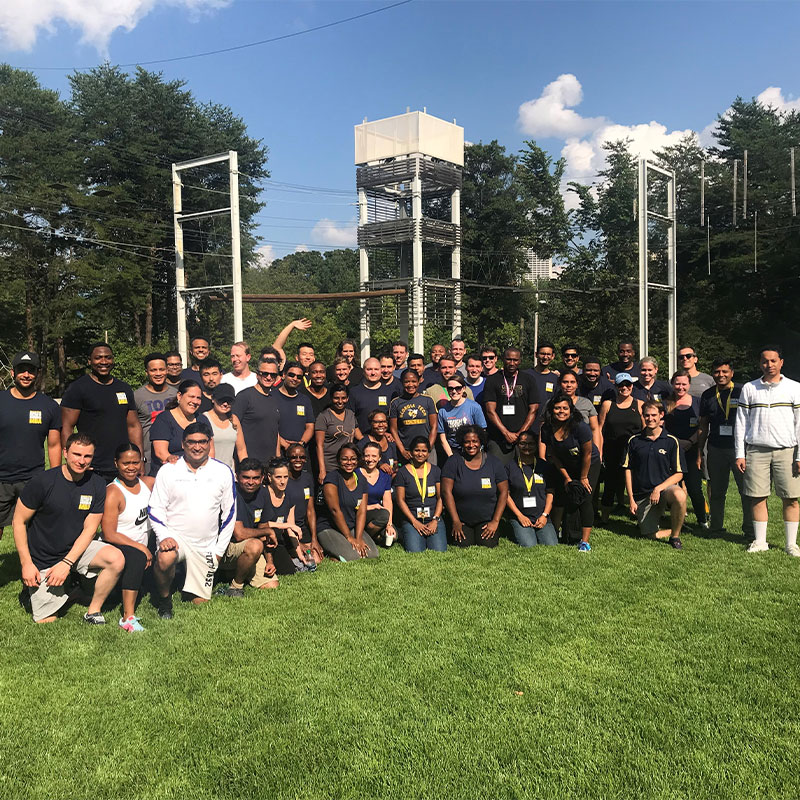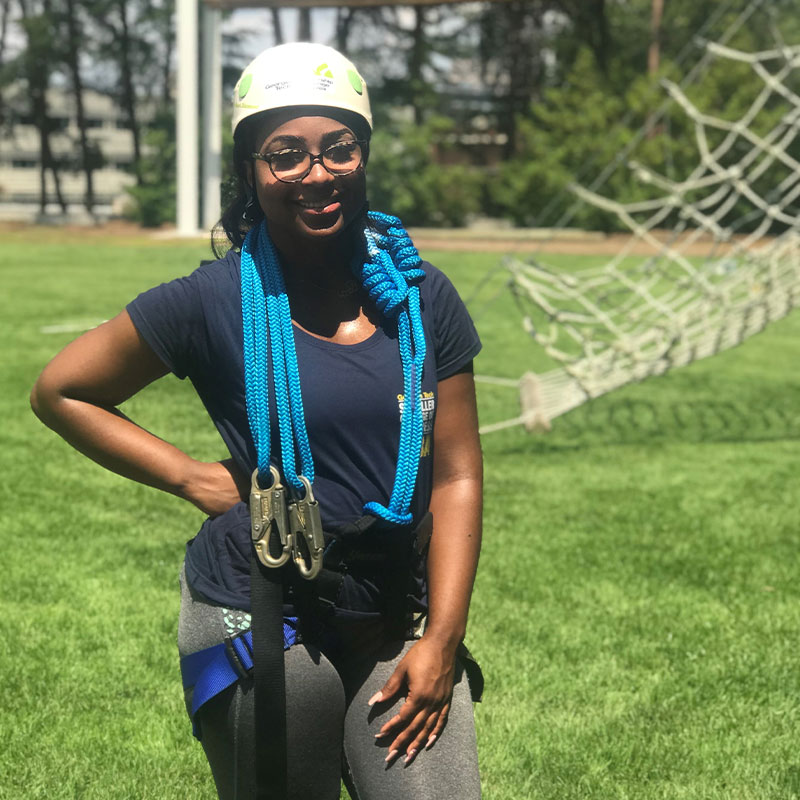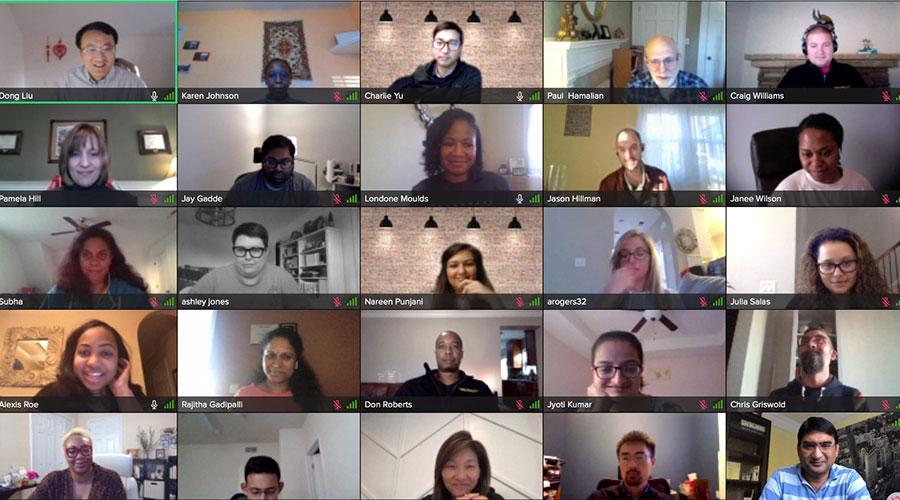You never know when a serendipitous encounter will change your life. For Alexis Roe, a casual conversation with a stranger was the catalyst for her Executive MBA journey at the Georgia Tech Scheller College of Business.
In 2019, after years of working in marketing and consulting, Roe was ready to upskill and earn her MBA degree. She didn’t know where to begin her research, so she turned to a friend in the Scheller Executive MBA program to learn about his experience.
“I wanted to know if he was able to successfully keep relationships while in school and working full-time,” she said. “He said, ‘I am not going to tell you because you’re not going to get into Georgia Tech—you’re not senior enough and the program is super competitive.’”
Shocked and hurt by his abrupt answer, Roe was determined to prove him wrong. The next day, on the way to work, she stepped into the elevator and struck up a conversation with a friendly gentleman.
“He asked me how my day was going, and I said good, but I was conflicted and told him the conversation I had with my friend,” she said. “And then I shared with him my past roles and aspirational goals. We exchanged contact information because he wanted to spend more time on our conversation.”
Roe didn’t think anything of the casual encounter. “I thought I was talking his ear off, she joked.” But the next day, she received an email from the Scheller College of Business that someone nominated her for the Executive MBA program. Unbeknownst to Roe, the man she chatted with was a student in the program.
She couldn’t believe it. Roe was shocked when she received the email that he had nominated her. She didn’t think talking to a stranger would open the doors to her next chapter. “It highlights the need for vulnerability,” she said.
Being vulnerable is nothing new for Roe. In fact, embracing her vulnerability and authenticity helped her overcome imposter syndrome on the first day of class.
“I was unbelievably nervous when I began the program,” Roe said. “I was one of the youngest in the class. I spent three hours practicing my introduction the night before the first day of school. However, when it came time to introduce myself to the class, I began to shake, realizing I wasn't presenting my authentic self. During my introduction, I pivoted my approach. Instead of sticking to the script, I decided to be more candid and said, "Hey y'all, I'm Alexis. I'm a hugger. You can call me Lexi." Even though I was nervous, I wanted to be myself. Afterward, my classmates said to me, ‘I’ve worked in corporate for years and haven’t been able to do that.’ From then on, I embraced who I am. It was liberating.”
Another time speaking from the heart was the right personal and professional move for Roe was when she and her classmates on the Executive MBA Student Leadership Team hosted diversity, equity, and inclusion panels in the wake of George Floyd’s death.
As they created the panels, Roe would be in for a surprise when one of the panelists would be her future boss at the Atlanta Hawks.
“Although we didn’t connect at the panel when I applied for the senior manager of DEI programs at the Hawks, she remembered me from facilitating those conversations,” she said.
Since joining the Atlanta Hawks in 2021, Roe has received two promotions and is now the vice president of DEI Impact and Strategic Initiatives. Her role includes advocating for environments where all people, particularly those from marginalized communities or with unconventional skill sets, feel seen, heard, valued, supported, and respected. Through her position, she champions inclusion initiatives to facilitate building a fair, brave, and safe space within the workforce and in our communities. She also supports planning sustainable and continual programs to ensure the Hawks show up consistently and authentically for communities.
Although titles no longer matter to Roe, she loves that her role involves empowering women to lead. “I grew up hearing little girls should be seen not heard,” she said. “As I grew older, I saw a lot of women in less powerful roles.”
As the vice president, Roe saw an opportunity for growth and curated its new development program: the She Leads Women’s Empowerment Program. The program supports the advancement of early-career women in Atlanta who work in business, sports, entertainment, STEAM, and entrepreneurship.
"There are many women passionate about sports and business, aspiring to leadership roles within a company," she remarked. "However, they may lack the necessary network connections or the full belief they have earned their seat at the table. These factors have fueled my passion for inspiring and supporting the next generation of leaders in our city and country—women rising in leadership."
Roe credits much of her success to the Executive MBA program. The metamorphic experience is one she is forever grateful for because it gave her the opportunity to expand her skill set, network, and stay true to herself. She’s even paid it forward by hosting two MBA capstone projects.
“I am so happy I was accepted into the Executive MBA program,” she said. “It was a phenomenal experience.”
We spoke with Roe to learn more about her time in the program, how her cohort advocated for her, and how she gained the skills to elevate her career.
How did you know Scheller was the best option for your career aspirations?
After being nominated, I researched the program more and knew it was for me. The notoriety of Georgia Tech speaks for itself, and I was looking forward to networking opportunities with tenured classmates and meeting professors who are passionate about their work and respected in Atlanta.
What were some of your goals going into the program?
I always had an aspirational goal of becoming a chief diversity officer. In my first corporate role, I worked at an ad agency in marketing with our client, The Home Depot, and focused on segmenting marketing for multicultural audiences. I loved helping the company explore impactful programming within these communities. Soon after, I realized I wanted to work in the diversity space for the long term, be on a corporate board, and be a cultural ambassador for the U.S. one day.
These were all the goals I had going into the program and chose the Global Business specialization because of the path I envisioned.
How soon did you implement what you were learning in class to your job?
During my time in the program, I worked for an innovation consultancy. One of the brands we partnered with was The Coca-Cola Company. We developed experiential activations and gathered data to enhance their understanding of customers. Additionally, we facilitated think tanks where various consumer segments tried out emerging products.
One of the classes offered in the program was a design thinking class. We had a guest speaker who oversaw design thinking at Ferrari, and he presented us with an exercise to brainstorm the potential uses of vending machines without any limitations. After that class, I immediately applied the same exercise during a think tank session at my workplace. The feedback we received was valuable. I continue to utilize this design thinking approach in developing impactful DEI and employee engagement strategies at the Hawks.
What was your experience with your cohort? Do you all keep in touch?
I keep in touch with many of my classmates to this day. During the pandemic, I was laid off — like a lot of people. However, one of my classmates consistently informed me about opportunities he came across. While some of them weren't suitable, those connections paved the way for future roles that emerged months later.
The power of the Georgia Tech network has shown me how influential and supportive it has been, and I have some of my greatest friends because of the program. I also took advantage of the office hours with my professors. They were approachable and wanted to help. Even when I faced challenges at work, they helped me with them.
How did you balance work, school, and your personal life while in the program?
It was challenging. I lost many friends who didn’t understand when you enter an MBA program, you must focus. I knew joining the program, I would have to give up the freedom that time offers you. I had to hunker down and invest in soaking up all the knowledge I could and embrace the opportunity I believe I had been blessed with.
I also recognized many of my peers were a lot more senior than I was, with significantly more experience; therefore, I worked hard to ensure I kept up. The homework assignments, coupled with the reading, were time-consuming. I committed to stretching my capacity to learn by emerging in the content because I had committed to the responsibilities that came with the program. It was a short-term sacrifice required to accomplish my goal of earning an Executive MBA.
How did the program help with the tools or skills needed to gain a promotion?
The strategy, marketing, and finance classes were instrumental in my promotions. From the strategy perspective, I examined our business cases we studied through a critical lens and referred to them and their teachings when facing business challenges. I’ve learned how to create a solid plan through leveraging the business model canvas. My economics professor was great because he taught us about the current state of our economy from a micro and macro perspective and how to consider scenario planning to future-proof your organization. We did scenario planning exercises that I have incorporated into my strategies today.
I also leveraged the design thinking exercises learned to explore innovative approaches for engaging our workforce, workplace, and marketplace. I began assessing the impact of supporting small businesses and crafting a strategy to enable maximum DEI impact. Through the classes, I learned the importance of crafting effective strategies, projecting impact, measuring outcomes, and comprehending results. These abilities have enabled me to better align with the company’s goals and objectives.
How has your view on leadership and business changed since graduating from the program?
I used to focus on titles because titles meant so much to the people around me throughout my career. If you didn’t have this title, you were not allowed in these spaces or granted a certain opportunity. Now, titles don’t mean anything to me.
Entering Georgia Tech, I was nervous about how my classmates would perceive me. However, during our group work sessions, I quickly realized we all shared the same questions and required similar clarification regarding the content taught by the professor. Some of my classmates were chief officers within their companies, and I was able to keep up with them. Realizing we were all on the same level reshaped how I thought of myself. That experience showed me I do belong in those spaces. If I went to a different school or school that didn’t challenge me, I don’t think I would have changed my perception.
So, titles became less significant, and executing the work with excellence is what matters to me. That change is largely because of my experience at Georgia Tech.
What advice do you have for prospective students considering their Executive MBA degree?
If you want to challenge yourself and shift your perspective on business concepts, I recommend the Executive MBA program. I had already been in business and came to class with examples to rework or ways to apply a new concept or strategy to my role. If I am learning something, I want to apply it today. It was invaluable that the students in the Executive MBA program had their unique perspectives from different industries, which enriched the conversations. I think our conversations would have shifted if we had students earlier in their careers.
I also think there is value in completing an MBA in person. Building strong relationships and showing up for your classmates and projects go far. I know many people who received jobs at each other’s companies because of the relationships established. You get out of the program what you put in.
